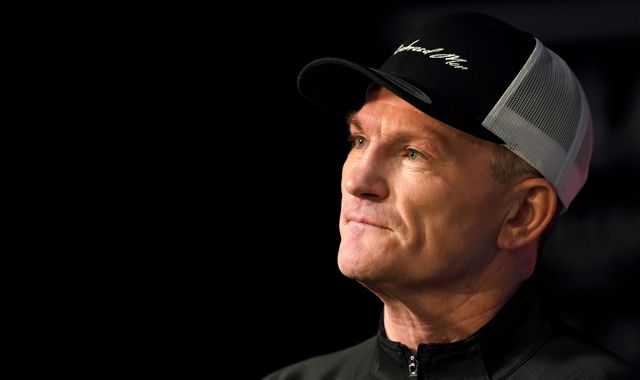No one before had injected the same kind of vibrant excitement into British boxing as Hatton did.
He was a national treasure, adored by the sporting public like Henry Cooper and Frank Bruno had been, but he was also a true world-beater.
When he toppled Kostya Tszyu to become the IBF super-lightweight world champion he beat one of the pound-for-pound greats to become the best fighter in the division.
He was a force of nature in that fight. Hatton was the underdog but he forced Tszyu out of the contest. He would not be denied on that night – his greatest, but one of many magical moments in his career.
His ability and accomplishment, a two-weight world champion who fought the very best of his generation in Tszyu, and both Floyd Mayweather and Manny Pacquiao, was just a part of what made him special.
Another part was his style of boxing. In the ring he combined sustained aggression, heartfelt determination, wicked body punching and perhaps underappreciated intelligence. It made for excitement every time he stepped through the ropes. Hatton felt it was his duty to entertain, and he did so every time.
His implacable buzzsaw attacks were part of his fighting style but his character outside the ring was wholly different. Every tribute made to the man recognises his warmth and kindness. There’s a reason for that. It was genuine and he was genuine. His sense of humour was ever apparent pre- and post-fight.
Accessible, affable, approachable, he never lost his connection to his supporters. His popularity spread across all Manchester, across the country and eventually went global.
He famously took over Las Vegas with a legion of fans when he fought Mayweather and Pacquiao.
The intensity of his support was legendary. He made unforgettable ringwalks to Manchester City anthem Blue Moon, headlined at his football club’s home ground and, with Tyson Fury and Anthony Joshua following after him, ushered in a new era of stadium-fillers in modern British boxing.
His lasting legacy will be what he meant to so many people.
Hatton was a unique combination of the extraordinary – his feats in the ring exceptional – and the ordinary. Everyone could relate to him. He lived like a monk in training camp but ate with gusto outside of it, drank with friends and supporters alike and was exuberant company for anyone.
“I was a world champion that was one of us,” he said himself.
You couldn’t put it better.
His story, from carpet fitter on a Manchester council estate to becoming a bona fide world champion, is a boxing fairytale. But also a cautionary tale for the sport. For all his accomplishments and his unparalleled popularity, he struggled, especially after retiring from competition.
Parting with trainer Billy Graham and tensions within his family troubled him. He was open about his difficulties with depression and addiction.
An ambassador for the mental health charity Campaign Against Living Miserably, he spoke frankly about his mental health and he did so to help others.
“As fighters, we tell ourselves we’re strong – we train, we sweat, we take hits, we get up. But sometimes the hardest fight happens in silence, in the mind,” Amir Khan wrote.
“Mental health isn’t weakness. It’s part of being human. And we must talk about it. We must reach out. We must lean on each other.
“We lost not only one of Britain’s greatest boxers, but a friend, a mentor, a warrior, Ricky Hatton,” Khan continued.
“Ricky, thank you for everything. For your fights, your moments of glory, your grit. Thank you for pushing us, showing us what’s possible.
“To everyone reading this: if you’re hurting or struggling, you are not alone. Talk. Reach out. Because we need more light, more compassion, more understanding.
“Rest well, Ricky. You’ll always have your place in the ring of our memories.”
After boxing, he operated as a promoter and worked as a trainer. The lure of the ring still lingered. He lost a 2012 comeback fight, took part in an exhibition with his friend and fellow boxing legend Marco Antonio Barrera in 2022 and was intending to box again later this year.
“That adrenalin rush, the roar from the crowd, that nervousness as you’re making your ringwalk. It’s the most nerve-wracking thing of any fighter’s preparation before the fight. But when it’s gone you miss it,” he once said.
He did it all, though, and he certainly did it his way. On his lifestyle, the fluctuating weight that saw him lean into the ‘Ricky Fatton’ nickname, while he wouldn’t recommend it, he said: “I don’t think I would change it.
“Because I think that’s what people loved about me.
“I worked hard all my life to have the fanbase that I did, I had the fanbase I did because I was exciting.
“I like to think they’ve loved my fights over the years.”
They loved the fights, definitely. But they loved him.
Only 46 years old, Hatton was a father and a grandfather.
In the estimation of his former promoter Frank Warren, Hatton was a modern great.
Warren wrote: “A superbly talented fighter who inspired a generation of young boxers and fans in a way very few had done before due to both his personality and the entertainment he provided in the ring.
“From making his debut in Widnes in 1997 to then go on to win one of the most historic fights in British boxing history against Kostya Tszyu in Manchester, Ricky will rightly go down as one of the modern greats of this sport.”
There was only one Ricky Hatton. Of course there’s only one Ricky Hatton.






























